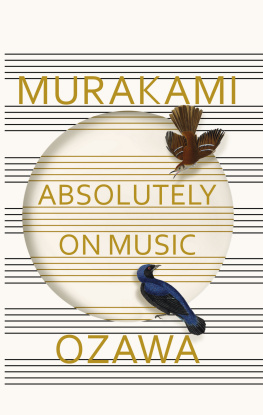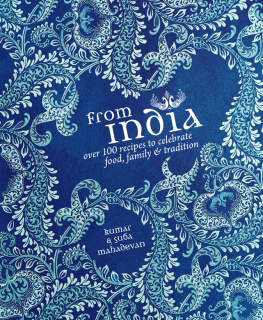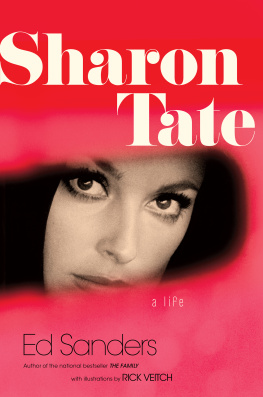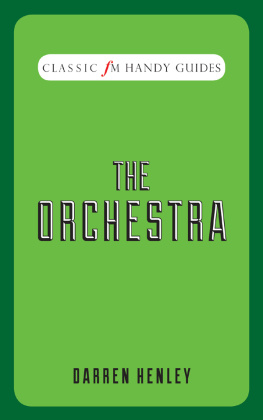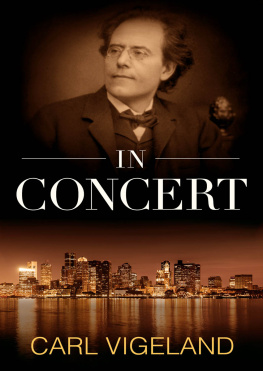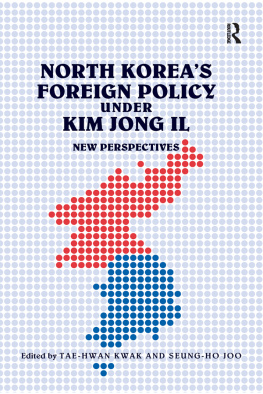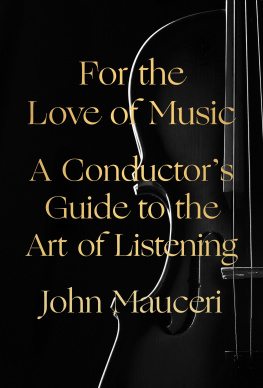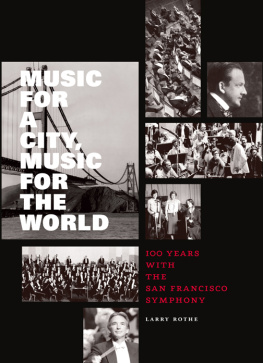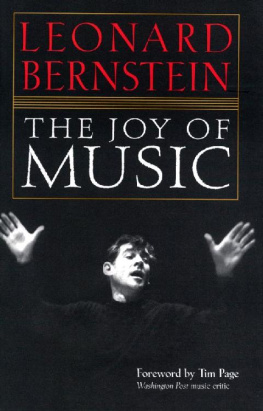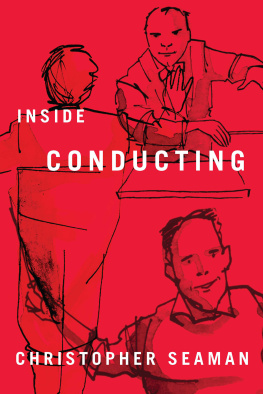ALSO BY HARUKI MURAKAMI
FICTION
After Dark
After the Quake
Blind Willow, Sleeping Woman
Colorless Tsukuru Tazaki and His Years of Pilgrimage
Dance Dance Dance
The Elephant Vanishes
Hard-Boiled Wonderland and the End of the World
Kafka on the Shore
Norwegian Wood
South of the Border, West of the Sun
Sputnik Sweetheart
The Strange Library
A Wild Sheep Chase
Wind/Pinball
The Wind-Up Bird Chronicle
1Q84
NON-FICTION
Underground: The Tokyo Gas Attack and the Japanese Psyche
What I Talk About When I Talk About Running
Introduction
My Afternoons with Seiji Ozawa
Until we started the interviews in this book, I had never had a serious conversation with Seiji Ozawa about music. True, I lived in Boston from 1993 to 1995, while he was still music director of the Boston Symphony Orchestra, and I would often go to concerts he conducted, but I was just another anonymous fan in the audience. Not long after that, my wife and I happened to become friends with his daughter, Seira, and we would see and talk to her father now and then. But our acquaintance was casual and had nothing to do with either his work or mine.
Perhaps one reason we never talked seriously about music until recently is that the maestros work kept him so fully involved. As a result, whenever we got together to have a drink, wed talk about anything other than music. At most, we might have shared a few fragmentary remarks on some musical topics that never led anywhere. Ozawa is the type of person who focuses all his energy on his work, so that when he steps away from it, he needs to take a breather. Knowing this, I avoided bringing up musical topics when I was in his company.
In December of 2009, however, Ozawa was found to have esophageal cancer, and after major surgery the following month, he had to restrict his musical activities, largely replacing them with a challenging program of recuperation and rehabilitation. Perhaps because of this regime, we gradually began to talk more about music whenever we met. As weakened as he was, he took on a new vitality whenever the topic turned to music. Even when talking with a musical layman such as myself, any sort of conversation about music seemed to provide the refreshment he needed. And the very fact that I was not in his field probably set him at ease.
I have been a fervent jazz fan for close to half a century, but I have also been listening to classical music with no less enjoyment, collecting classical records since I was in high school, and going to concerts as often as time would permit. Especially when I was living in Europefrom 1986 to 1989I was immersed in classical music. Listening to jazz and the classics has always been both an effective stimulus and a source of peace to my heart and mind. If someone told me that I could listen to only one or the other but not to both, my life would be immeasurably diminished. As Duke Ellington once said, There are simply two kinds of music, good music and the other kind. In that sense, jazz and classical music are fundamentally the same. The pure joy one experiences listening to good music transcends questions of genre.
During one of Seiji Ozawas visits to my home, we were listening to music and talking about one thing or another when he told me a tremendously interesting story about Glenn Gould and Leonard Bernsteins 1962 performance in New York of Brahmss First Piano Concerto. What a shame it would be to let such a fascinating story just evaporate, I thought. Somebody ought to record it and put it on paper. And, brazen as it may seem, the only somebody that happened to cross my mind at the moment was me.
When I suggested this to Seiji Ozawa, he liked the idea immediately. Why not? he said. Ive got plenty of time to spare these days. Lets do it. To have Seiji Ozawa ill with cancer was a heart-wrenching development for the music world, for me personally, and of course for him; but that it gave rise to this time for the two of us to sit and have good, long talks about music may be one of those rare silver linings that are not in fact to be found in every cloud.
As much as I have loved music over the years, I never received a formal musical education, have virtually no technical knowledge of the field, and am a complete layman where most things musical are concerned. During our conversations, some of my comments may have been amateurish or even insulting, but Ozawa is not the sort of person to let such things bother him. He gave each remark serious thought and responded to each question, for which I was tremendously grateful.
I handled the tape recorder, transcribed our conversations myself, and presented the manuscript to him for corrections.
Come to think of it, Ive never really talked about music like this before, in such a focused, organized way. This was the very first thing Ozawa said to me after reading the finished manuscript. But wow, my language is so rough! Do you think readers are going to understand what Im saying?
Its true, the maestro does speak his own special brand of Ozawa-ese, which is not always easy to convert to standard written Japanese. He gesticulates grandly, and many of his thoughts emerge in the form of songs. Still, whatever roughness there may be in the way he expresses himself, the feeling he seeks to convey comes through with startling immediacy, overarching the wall of words.
Despite being an amateur (or perhaps because of it), whenever I listen to music, I do so without preconceptions, simply opening my ears to the more wonderful passages and physically taking them in. When those wonderful passages are there, I feel joy, and when some parts are not so wonderful, I listen with a touch of regret. Beyond that, I might pause to think about what makes a certain passage wonderful or not so wonderful, but other musical elements are not that important to me. Basically, I believe that music exists to make people happy. In order to do so, those who make music use a wide range of techniques and methods which, in all their complexity, fascinate me in the simplest possible way.
I tried my best to preserve this attitude when listening to what Maestro Ozawa had to say. In other words, I tried my best to remain an honest and curious amateur listener on the assumption that most of the people reading this book would be amateur music fans like me.
At the risk of sounding somewhat presumptuous, I confess that in the course of our many conversations, I began to suspect that Seiji Ozawa and I might have several things in common. Questions of talent or productivity or fame aside, what I mean here is that I can feel a sense of identity in the way we live our lives.
First of all, both of us seem to take the same simple joy in our work. Whatever differences there might be between making music and writing fiction, both of us are happiest when absorbed in our work. And the very fact that we are able to become so totally engrossed in it gives us the deepest satisfaction. What we end up producing as a result of that work may well be important, but aside from that, our ability to work with utter concentration and to devote ourselves to it so completely that we forget the passage of time is its own irreplaceable reward.
Secondly, we both maintain the same hungry heart we possessed in our youth, that persistent feeling that this is not good enough, that we must dig deeper, forge farther ahead. This is the major motif of our work and our lives. Observing Ozawa in action, I could feel the depth and intensity of the desire he brought to his work. He was convinced of his own rightness and proud of what he was doing, but not in the least satisfied with it. I could see he knew he should be able to make the music even better, even deeper, and he was determined to make it happen even as he struggled with the constraints of time and his own physical strength.

